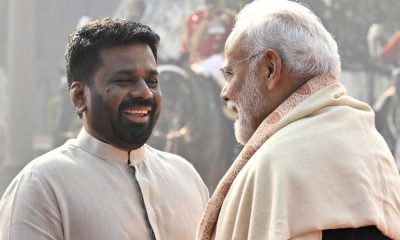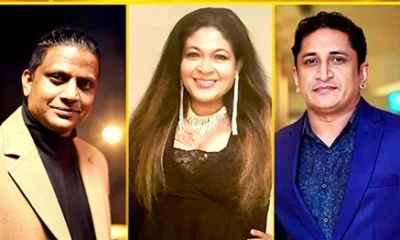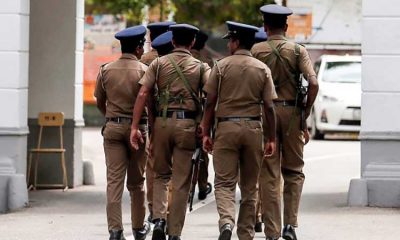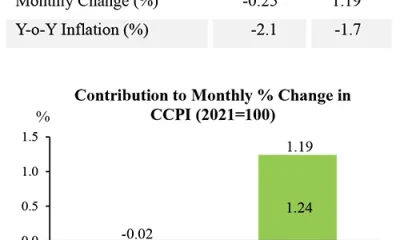Editorial
LG polls: Cabinet cuts the Gordian knot

Wednesday 4th December, 2024
The Rajapaksa-Wickremesinghe government was responsible for turning the electoral process into a mess. It arbitrarily postponed the Local Government (LG) elections. The Election Commission (EC) had made all arrangements for the mini polls to be held when President Ranil Wickremesinghe, ably assisted by the SLPP, threw a monkey wrench in the works in defiance of a court order; he refused to allocate funds for the elections.
The LG polls have been rescheduled for 2025, and the Cabinet has reportedly decided to amend the Local Authorities Elections Ordinance to call for fresh nominations. It has in fact chosen to cut the Gordian knot. Amending the LG election laws is the only way to cause the previous nomination lists to lapse. Many of those who secured nominations to contest the LG polls last year have either changed political parties or left the country or gone the way of all flesh. Some of them have entered Parliament.
It has been reported that the LG polls are likely to be held either in January or February 2025. The Supreme Court has ordered that the LG elections be held as soon as possible, and why the EC is in overdrive is understandable.
Ideally, the LG polls should be conducted under the Proportional Representation (PR) system until the Mixed-Member Proportional system is streamlined; the current electoral system has led to a huge increase in the number of local council members from about 4,000 to more than 8,000.
The upcoming LG polls will assume the importance of a national election because it will serve as a litmus test on the new government’s popularity. The NPP’s impressive victory in the general election will still be fresh when the country goes to the polls to elect local councils, but the government’s maiden Budget will have been unveiled by that time, and the people will be able to see how serious the ruling alliance is about fulfilling its main election promises, especially pay hikes for state employees, substantial tax revisions and relief for the needy.
The government has admitted that the IMF will have a say in the formulation of Budget 2025, and therefore it is doubtful whether the NPP will be able to carry out some of its key promises. More importantly, the government will have to reveal its position on the imputed rental income tax, which is required to be introduced early next year.
The government already stands accused of having reneged on some of its main election promises. Before the September presidential election, the NPP vowed to slash fuel prices, claiming that they remained high due to unconscionable government taxes and corruption. The people were given to understand that electricity tariffs would be reduced substantially, and some NPP politicians claimed that a 30% decrease in electricity prices was in the realm of possibility, but they are now humming a different tune. The police have used brutal force to crush a development officers’ protest near the Education Ministry. Most of those protesters backed the NPP in the presidential and parliamentary elections. The Prevention of Terrorism Act, which the JVP/NPP pledged to abolish immediately after forming a government has been used against some social media activists. Millers have created a rice shortage and jacked up the prices of all varieties of rice. The government has baulked at taking tough action it promised against the unscrupulous millers whom its leader blamed for hoarding paddy and fleecing consumers and farmers, during the NPP’s parliamentary election campaign. Coconut prices have gone through the roof. Farmers affected by floods are crying out for relief; they are resentful that the government has offered only Rs. 40,000 per acre as compensation for crop losses.
The biggest challenge before the government ahead of the LG polls will be to retain its approval ratings vis-à-vis the Opposition’s all-out efforts to whip up anti-incumbency sentiments and regain lost ground.
Editorial
For God’s sake …

Tuesday 7th January, 2025
The JVP has a history of disrupting universities, schools, and workplaces. Thankfully, since its ascent to power, the seats of higher learning and public institutions have remained calm. But, now, it stands accused of having disrupted one of the holiest shrines in Sri Lanka—Sri Saman Devale, Ratnapura. All workers of the shrine have launched a strike in protest against the appointment of an Acting Basnayake Nilame (Chief Custodian). The appointment is politically motivated, and the person concerned is not eligible to hold that post, the protesting workers have said, claiming that never has there been a previous instance of such blatant political interference with the administration of the shrine. Commissioner General of Buddhist Affairs R. M. P. Ratnayake has said there is nothing wrong with the appointment of the Acting Basnayake Nilame, but the issue is far from resolved.
Political appointments desecrate religious places. Sadly, elections to the Basnayake Nilame posts at many shrines are political battles in all but name. Everything that politicians touch turns into a mess. They meddle with religious places on the pretext of ridding them of malpractices and settling internal disputes. If there are allegations against the custodians of holy shrines, let the proper process be followed in probing them. Politicians must keep away from the affairs of religious places.
Having trounced its political opponents in the last general election, the JVP-led NPP is apparently trying to take the battle for dominance to the celestial level. It has chosen to vie with the deities for superiority, no less. Minister of Health and Cabinet Spokesman Dr. Nalinda Jayatissa has drawn heavy flak for a controversial statement he made at a recent ceremony to mark the opening of a children’s bone marrow transplant unit built at Apeksha Hospital, Maharagama, with generous financial support from the Ruhunu Kataragama Maha Devale. After reportedly praising the chief custodian and the workers of the shrine and the devotees who made the completion of the project possible, Minister Jayatissa in his wisdom said, among other things, that not even God Kataratagama or the 330 million deities who are believed to be guarding this country would have been able to match the funds the Sri Lankan governments had allocated for the Health Ministry. The incumbent NPP administration would make an even bigger financial allocation for the health sector from Budget 2025, he said.
Minister Jayatissa has triggered an avalanche of criticism, and the government propagandists have sought to control damage by launching a vilification campaign against the Kataragama Devale Basnayake Nilame D. Gunasekera. They have been making allegations of various malpractices against him. If there is credible evidence to prove those allegations, legal action must be instituted against him, but his leadership for a successful campaign to save the lives of cancer-stricken children must be lauded. There are many other religious places as well as secular organisations providing generous financial support to the state-run health institutions. They deserve praise for their concern for the sick and generosity. It behoves the self-important politicians to refrain from making snide remarks that hurt and dishearten such donors.
Interestingly, Minister Jayatissa has contradicted one of the government’s claims, albeit unwittingly; the NPP has said that previous governments contributed nothing towards public wellbeing for 76 years after Independence. It has gone to the extent of calling the post-Independence period the ‘76-year curse’. But the Cabinet Spokesman has declared that successive governments have even outdone the deities in providing funds for free healthcare! Equally, Dr. Jayatissa is a past student of the C. W. W. Kannangara Central College, Matugama. President Anura Kumara Dissanayake attended the Thambuttegama Central College, which was also born out of the vision and mission of Kannangara, the ‘Father of Free Education’ in Sri Lanka. An article published in this newspaper today reveals how other political leaders like A. Ratnayake made a commendable contribution towards making free education a reality. So, how can the NPP, which cannot even carry out a simple task like making rice and coconuts freely available at affordable prices, say the country did not gain anything for 76 long years?
True, Sri Lanka has not been able to achieve its development goals mainly due to corruption and blunders of previous governments. The challenge before the NPP is to put the country right without fighting political battles, interfering with religious institutions and tilting at newspaper offices.
It is hoped that the absurd behaviour of some key government leaders does not exemplify what the deities are said to do to those whom they wish to destroy.
Editorial
Drivers from hell

Monday 6th January, 2025
President Anura Kumara Dissanayake’s ambitious, catch-all project, ‘Clean Sri Lanka’, is in the same perilous situation as pedestrians in this country—it runs the risk of being knocked down by private buses and trishaws, in a manner of speaking. As part of the ‘Clean Sri Lanka’ initiative, the police have been in overdrive during the past few days to nab errant private bus and trishaw drivers and strip their contraptions of unauthorised accessories, deafening horns, blinding lights and overly loud exhausts. They are also deploying plainclothesmen in buses to watch out for traffic law violations committed by drivers. They have so far instituted legal action against a large number of drivers. More power to their elbow!
Associations of private bus and trishaw operators are letting out howls of protests against the ongoing programme to make roads safe. Claiming that drivers find it extremely difficult to operate under the current circumstances, those outfits have issued warning to the government; they say they will be compelled to adopt countermeasures unless the police abandon the road safety programme. If private bus and tuk-tuk fraternities abide by the law, they will not be affected by the ongoing police operations. They are protesting because they commit offences such as driving under the influence of alcohol or narcotics, reckless driving, using mobile phones while driving, lane jumping, ignoring signal lights, disregarding pedestrians’ right of way, etc.
Having backed the JVP-led NPP to the hilt in the presidential and parliamentary elections, last year, the warring private bus and trishaw operators seem to think they enjoy legal immunity. Their spokespersons have audaciously asked the police not to devalue the ‘Clean Sri Lanka’ programme by conducting the ongoing operations aimed at making roads safe for everyone!
The NPP government has already capitulated to a bunch of big-time rice millers who have become a law unto themselves, and are apparently running a parallel government. They bankroll election campaigns and have government leaders eating out of their hands. This has led to a situation where a handful of wealthy millers are exploiting consumers and paddy farmers with impunity.
The NPP leaders used to bellow rhetoric, vowing to tame the millers and ensure that the interests of the farming community and the public would prevail, but they float like bees and sting like butterflies when they confront the millers’ cartel. Whether they will give in to pressure from the protesting bus and trishaw operators and ask the police to give the lawbreakers free rein remains to be seen.
President of the Lanka Private Bus Owners’ Association Gemunu Wijeratne, who is protesting against the current traffic police operations, has gone on record as saying that about 50% of bus workers are addicted to narcotics. That is the reason why the police must keep a watchful eye on private bus drivers to ensure the safety of all road users. Instead of flaying the police and the government, he ought to extend the fullest cooperation of his association to them. Similarly, the government should look into the private bus drivers’ grievances. They are without proper rest areas. Most of them are overworked and therefore fatigued. Stress may be one of the reasons for their addiction to alcohol and narcotics, and this aspect of the problem needs to be addressed. But nothing can be cited in extenuation of the violation of traffic laws and endangering the lives of road users. The police must be given a free hand to deal with the drivers from hell and prevent road accidents which destroy about seven lives a day.
The NPP leaders may be able to hold their political enemies at bay, but it looks as if they needed divine help to save themselves from their ‘friends’ in the garb of millers, cabbies and private bus drivers.
In fact, with friends like the protesting private bus and trishaw operators, the government needs no enemies.
Editorial
Hemin, hemin (slowly, slowly)

The dawn of the New Year 2025 last week, with a new president and a new government enjoying what is being called a “super majority” in parliament raises the inevitable question of whether the country can be made to take a new direction ensuring the promised better life for all its people.
“System change” has been the buzzword since the aragalaya in 2022 compelled first the resignation of then Prime Minister Mahinda Rajapaksa followed by that of his brother, President Gotabaya Rajapaksa who fled the country and tendered his resignation from Singapore. The unlikely ascension of Ranil Wickremesinghe, who had lost his own parliamentary seat in the 2020 general election having led the United National Party to a zero elected seat debacle, followed two years later.
The country was in a shambles with motorists lining up in miles long fuel queues with those seeking cooking gas for their kitchens faring little better. Everything that could go wrong had gone wrong but GR, thankfully, did not order the military and the police to shoot at the rioters at his gates. Wickremesinghe who had entered parliament after much foot dragging via the single National List place won by the UNP was elected to serve the balance Gotabaya Rajapaksa presidential term by the Sri Lanka Podu Jana Peramuna (SLPP), the Rajapaksa party.
He to his credit he was able to restore a semblance of normalcy thanks to negotiating a demanding IMF program and the generosity of India. But this was achieved at great cost to ordinary people burdened with a near unbearable cost of living necessitated by IMF insistence that the government reaches prescribed revenue targets and achieve debt sustainability.
An all pervading Value Added Tax (VAT) rising from eight percent in 2021 to 12 percent in May 2023 and 15% in September that year before being hiked to 18% last year took its obvious toll together with high personal income taxes that sent the middle class reeling.
Although NPP/JVP leader Anura Kumara Dissanayake had just three seats in the last parliament, he comfortably led the field at the last presidential election where none of the front-runners were able to clear the barrier of 50 percent of the total poll forcing a count of preference votes.
But that made little difference with AKD with 42.31 percent well ahead of Sajith Premadasa (32.16%) with Ranil Wickremesinghe trailing with 17.27%. Namal Rajapaksa was a pathetic also ran. But the general election which followed weeks later saw a surge for the winning side with the NPP/JVP winning 159 seats in the 225-member legislature with 61.56% of the national vote, up from the 3.84% scored at the previous parliamentary election.
Wickremesinghe hoped for a mandate on the strength of his long experience and post-aragalaya success but ran as an independent candidate with the backing of his impotent UNP and fragments of the SLPP he was able to win over as president. But the SLPP he had antagonized wanted to run its own candidate and refused to back him, choosing Namal Rajapaksa, the heir apparent of the Rajapaksa dynasty, who threw his hat into the ring after billionaire businessman Dhammika Perera saw the light as E-Day approached. Namal wisely saw the coming colour and chose not to seek election but gain entry to parliament through the SLPP National List. He clearly funked the voters who have thrown the rest of the Rajapaksas into the dustbin of history.
The present regime, and notably its leader, has at least for the present won over a great many unlikely supporters as the parliamentary election results clearly indicate. Diluting memories of the JVP’s violent past, much of it water under the bridges, when many of those who voted last September and November were not even born, the former revolutionaries who twice attempted to seize power violently, became the NPP/JVP with the latter firmly in the driving seat merging seamlessly with over 20 other diverse groups including political parties, workers unions, women’s rights groups and youth organizations. The vast majority of those elected to the incumbent parliament are newcomers barely known outside their own pocket boroughs. So also many members of the cabinet although the powerful ministries are held by JVPers.
There is no doubt that as is the case of cadre based Marxists parties like the JVP which continues to fly the Hammer and Sickle red flag outside its headquarters, a lot of power – more so perhaps than within the cabinet – lies within the Politbureau (or whatever it is called) of the JVP. Early signals have been that there will be no rocking of the boat in the short term. The Colombo stock market galloped to new highs under the new order – although it began losing some steam on Friday – depite dire predictions of a crash under a JVP government. Relations with the IMF are on an even keel and with the staff level agreement reached in November there is no reason to fear interruption of the forward momentum.
The Governor of the Central Bank and the Secretary to the Ministry of Finance under the old order continue in office. Imaginative appointments such as those of Mr. Duminda Hulangamuwa and Dr. Hans Wijesuriya have suggested that the leftist government means business. Many reputed business leaders have been seen at NPP/JVP events pre-election and other occasions where the president was -present. While JVPers were also there, the clear signal is that the private sector is not being given the cold shoulder.
-

 Features6 days ago
Features6 days agoAKD faces challenging year ahead
-

 Editorial6 days ago
Editorial6 days agoA kiri-kekiri issue
-

 Sports6 days ago
Sports6 days agoSt. Sebastian’s dominate at Bambalapitiya
-

 Features5 days ago
Features5 days agoThey, too, had a ball …Down Under
-

 News3 days ago
News3 days agoReshuffle of senior cops on the cards
-

 Business5 days ago
Business5 days agoCCPI-based headline inflation continued to remain in negative territory in December 2024
-

 Editorial4 days ago
Editorial4 days agoBribe-gate and other unsolved plots
-

 Editorial5 days ago
Editorial5 days agoMessages and subtexts












